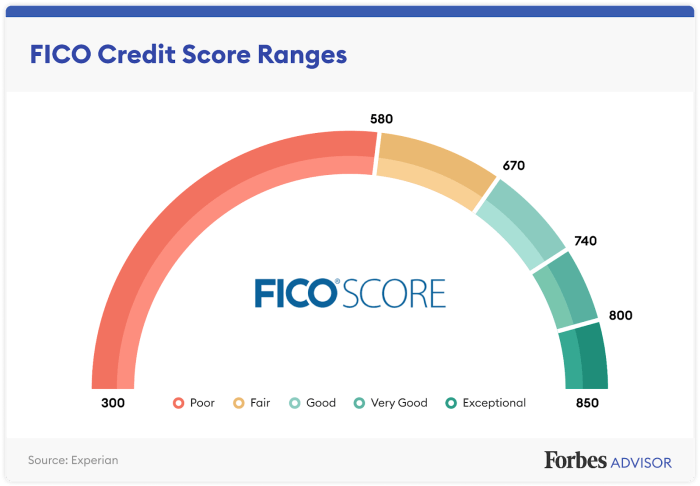Diving into the world of finances, one number holds the key to unlocking a world of opportunities – your FICO score. It’s not just a random number; it’s a powerful tool that can make or break your financial journey. Let’s unravel the mysteries behind FICO scores and discover how this three-digit number can shape your financial future.
From understanding the basics to mastering the art of improving your score, this guide will take you on a journey through the intricate world of FICO scores. So, buckle up and get ready to navigate the twists and turns of creditworthiness like a pro.
Understanding FICO Scores
FICO scores play a crucial role in determining an individual’s creditworthiness and financial health. These scores are used by lenders to assess the risk of lending money to a borrower.
Calculation of FICO Scores
FICO scores are calculated based on several factors, including:
- Payment history
- Amount owed
- Length of credit history
- New credit
- Credit mix
These factors are analyzed by credit bureaus to generate a three-digit FICO score that ranges from 300 to 850.
Importance of Good FICO Scores
Having a good FICO score is essential for obtaining loans and credit at favorable terms. A higher FICO score indicates lower credit risk, making lenders more willing to offer loans with lower interest rates and better terms.
Factors Influencing FICO Scores
Your FICO score is influenced by a variety of factors that reflect your creditworthiness. Understanding these key factors can help you manage your credit more effectively.
Payment History and Credit Utilization
One of the most significant factors impacting your FICO score is your payment history. Late payments or defaults can have a negative impact on your score, while consistent on-time payments can improve it. Additionally, credit utilization, or the amount of credit you use compared to your total available credit, also plays a crucial role. Keeping your credit utilization low can positively affect your FICO score.
Length of Credit History and Types of Credit Used
The length of your credit history is another important factor in determining your FICO score. Lenders want to see a long and positive credit history to assess your creditworthiness. Moreover, the types of credit you use, such as revolving credit (credit cards) and installment loans (mortgages, auto loans), can impact your score. A healthy mix of credit types can demonstrate responsible credit management.
New Credit Inquiries and Credit Mix
When you apply for new credit, it results in a hard inquiry on your credit report, which can temporarily lower your FICO score. Multiple inquiries within a short period may raise red flags to lenders. Additionally, having a diverse credit mix, including both revolving and installment accounts, can positively influence your FICO score by showcasing your ability to handle different types of credit responsibly.
Improving FICO Scores

To improve your FICO score, there are several key strategies you can implement. By focusing on making on-time payments, reducing debt, monitoring credit reports, and disputing errors, you can positively impact your credit profile.
Making On-Time Payments
- Set up automatic payments or reminders to ensure you never miss a payment.
- Pay at least the minimum amount due on all accounts to avoid negative marks on your credit report.
- Consistently making on-time payments can demonstrate responsible financial behavior to creditors.
Reducing Debt
- Create a budget to allocate more funds towards paying off existing debts.
- Focus on paying down high-interest debts first to reduce overall interest costs.
- Keep credit card balances low relative to your credit limit to improve your credit utilization ratio.
Monitoring Credit Reports
- Regularly check your credit reports from all three major credit bureaus for any inaccuracies.
- Report any errors or fraudulent activity to the credit bureau to have them investigated and corrected.
- Monitoring your credit reports can help you proactively address any issues that may impact your FICO score.
Maintaining a Good FICO Score
- Avoid opening unnecessary new credit accounts to prevent potential negative impacts on your credit score.
- Keep older accounts open to maintain a longer credit history, which can positively influence your score.
- Regularly review your credit utilization and aim to keep it below 30% to demonstrate responsible credit usage.
Understanding FICO Score Ranges
When it comes to FICO scores, it’s essential to understand the different score ranges and what each signifies. Your FICO score can fall into one of the following categories: poor, fair, good, or excellent. Each range has implications for your financial health and opportunities.
Poor FICO Score (300-579)
- A poor FICO score typically indicates a high credit risk to lenders.
- Individuals with poor scores may struggle to qualify for loans or credit cards.
- Higher interest rates and limited credit options are common for those with poor scores.
Fair FICO Score (580-669)
- A fair FICO score suggests some credit issues but is not as severe as a poor score.
- Individuals with fair scores may have limited credit options and higher interest rates.
- There is room for improvement to reach a good score with responsible credit behavior.
Good FICO Score (670-739)
- A good FICO score indicates responsible credit management and lower credit risk.
- Individuals with good scores can qualify for better loan terms and credit options.
- Maintaining a good score is important for financial stability and future opportunities.
Excellent FICO Score (740-850)
- An excellent FICO score represents a low credit risk and strong creditworthiness.
- Individuals with excellent scores have access to the best loan terms and credit offers.
- Having an excellent score opens doors to various financial opportunities and benefits.
